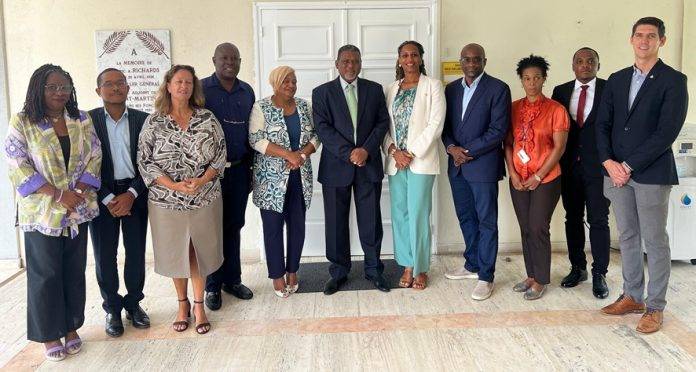
GREAT BAY, St. Maarten — The administrations of both halves of the island are committed to establishing a Memorandum of Understanding (MOU) on Agriculture, Fisheries, and Animal Husbandry that will facilitate synchronization of policies, and enhance relationships while facilitating partnerships.
This was agreed upon when Minister of Tourism, Economic Affairs, Transport and Telecommunication (TEATT), Grisha Heyliger-Marten met last week with Vice President of the Collectivity of St. Martin, Alain Richardson.
Welcoming the Minister and her delegation, Vice President Richardson emphasized the critical need for food security on the island, and highlighted the vulnerabilities exposed by hurricane Irma and the COVID-19 pandemic. He further stressed the importance of reducing food imports for health reasons and achieving self-sufficiency.
For her part, Minister Heyliger-Marten pointed to the need to balance agricultural development with environmental preservation. Both government officials agreed that agricultural training should be integrated into school curricula, with the possibility of setting up specialized agricultural schools.

The proposed MOU will similarly allow for joint efforts to preserve natural habitats and biodiversity, while promoting sustainable development. In addition, it would facilitate efforts to boost agri-tourism with restaurants being encouraged to use 100% locally grown food in their menus.
The two sides also agreed to share results of studies and research that would lead to better synchronization of policies and standards in various areas.
“I want to thank Vice President Richardson and the entire Collectivité for this meeting, which I see as a step in the right direction,” stated Minister Heyliger-Marten. “Our shared vision of ensuring food security and collaborating and synchronizing our agricultural and fisheries policies is an indication of our commitment to work together for the common good.”
“Collaborative efforts and strategic partnerships with our brothers and sisters in the North will help us to achieve sustainable agricultural and fisheries development which is good for the entire island,” concluded Heyliger-Marten.





























